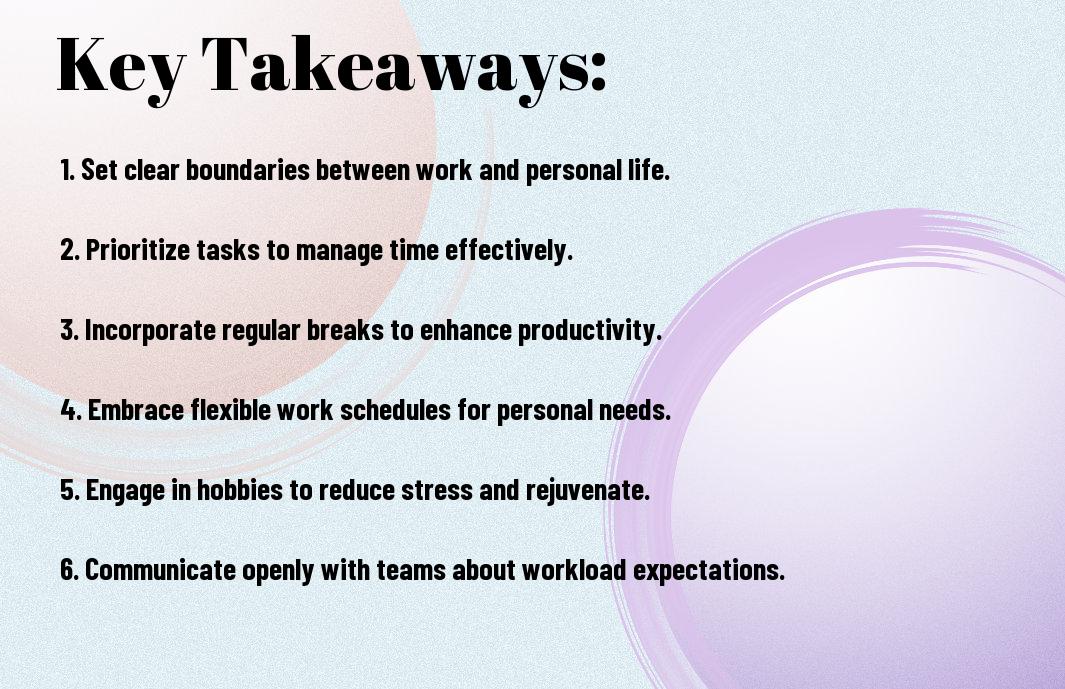Over the years, achieving work-life balance has become vital for software engineers like you, as the demands of the tech industry often lead to burnout and dissatisfaction. By implementing effective strategies, you can enhance your productivity while ensuring a fulfilling personal life. Prioritizing self-care and setting boundaries is important for your mental well-being. This blog post will provide valuable insights to help you create a healthy equilibrium between your professional responsibilities and personal interests, ultimately leading to a more rewarding career.
Key Takeaways:
- Establish clear boundaries between work and personal life to prevent burnout and maintain mental well-being.
- Utilize time management techniques, such as the Pomodoro Technique or time blocking, to enhance productivity while allowing for regular breaks and personal time.
- Prioritize self-care activities, including exercise, hobbies, and social connections, to foster a balanced and fulfilling lifestyle.
Understanding Work-Life Balance
Definition and Importance
The concept of work-life balance often refers to the equilibrium you maintain between the demands of your professional life and your personal life. It is necessary to recognize that achieving this balance is not merely about allocating equal time to both but rather about ensuring that neither aspect overwhelms the other. This balance is vital for your overall well-being, as it helps you avoid burnout, increases productivity, and fosters personal satisfaction. By prioritizing work-life balance, you allow yourself the opportunity to engage meaningfully with both your career and personal interests.
Alongside the benefits to your mental and emotional health, work-life balance also plays a significant role in fostering creativity and innovation in your work. When you create boundaries that encourage downtime and personal growth, you are more likely to return to your work with renewed energy and fresh perspectives. This balance equips you to not just survive, but thrive in your professional environment, paving the way for a fulfilling career in software engineering.
Common Challenges for Software Engineers
An increasing number of software engineers are facing significant hurdles when it comes to achieving a healthy work-life balance. Long hours, tight deadlines, and the overwhelming nature of the tech industry can lead to feelings of stress and fatigue. Moreover, the rapid pace of technological change often requires you to adopt new skills quickly, which can exacerbate feelings of inadequacy or pressure. These challenges can make it difficult to disconnect from work and fully engage with other aspects of your life.
Further, the blurring of lines between work and personal time due to remote work options can create a situation where you struggle to establish clear boundaries. If you find yourself constantly checking emails or working late into the night, it can be easy to lose sight of your personal life and well-being. By understanding these challenges and addressing them proactively, you can safeguard your time and energy, ensuring that both your professional and personal lives flourish. Prioritizing self-care and setting firm limits can help you navigate the demanding landscape of software engineering while maintaining your health and happiness.
Strategies for Achieving Work-Life Balance
Setting Boundaries
On your journey to achieving a sustainable work-life balance as a software engineer, establishing firm boundaries between work and personal time is vital. It’s easy to get caught up in project deadlines and late-night coding sessions, but preserving your time for family, hobbies, and self-care is equally important for your well-being. Start by designating specific work hours and communicate these to your team and family. This clarity ensures everyone—inclusive of yourself—understands when you are available and when you need uninterrupted personal time.
Additionally, you should leverage tools and techniques to reinforce these boundaries. Consider using apps that help manage notifications or set do-not-disturb hours on your devices. Creating physical distance between your workspace and personal space can also signal to your brain when it’s time to focus on work and when it’s time to relax. By maintaining clear boundaries, you foster a healthier mindset that prevents burnout and enhances overall productivity.
Time Management Techniques
Between juggling multiple projects and meeting strict deadlines, it is vital for software engineers to master effective time management techniques. Prioritizing your tasks using methods such as the Eisenhower Matrix or the Pomodoro Technique can significantly enhance your productivity while carving out time for leisure activities. By breaking your work into manageable chunks, you reduce the feeling of being overwhelmed and create an atmosphere conducive to high-quality coding.
Incorporating techniques like time blocking can help you allocate dedicated time slots for different activities, ensuring that both work and personal tasks receive the attention they deserve. Scheduling breaks throughout your day will help you recharge and maintain focus, thus preventing fatigue and burnout. Overall, these strategies not only make your work process more efficient but also allow you to enjoy personal interests outside of coding.
Leveraging Remote Work Flexibility
Boundaries may evolve when you take advantage of the flexibility that remote work offers. Without the constraints of a traditional office layout, you have the opportunity to customize your work environment to better suit your needs. Whether it’s adjusting your hours to include more personal activities or creating an ergonomic workspace, the control is in your hands. Use this flexibility to align your work schedule with your peak productivity times while also ensuring you set aside moments to engage in self-care and personal pursuits.
Remote work not only grants you the ability to adapt your work hours but also allows you to cultivate a work environment that promotes balance. By setting up your workspace in a way that invites creativity and comfort, you are more likely to find enjoyment in your tasks—and less likely to experience fatigue. Consider incorporating designated ‘unplugged’ times where you fully disengage from work tasks to take part in activities that rejuvenate you.

Prioritizing Mental Health
After positioning yourself in the demanding world of software engineering, it’s important to prioritize your mental health. The fast-paced environment often leads to stress, making it all the more important to create a balanced life both in and outside of work. Developing strategies to maintain your mental well-being can greatly enhance your productivity and job satisfaction, allowing you to thrive in your career without sacrificing your personal life.
Recognizing Burnout Symptoms
Along your journey in the tech industry, it’s important to keep an eye out for signs of burnout. You might notice persistent feelings of fatigue, irritability, or an increasing sense of cynicism towards your work tasks. These symptoms can wreak havoc on your mental state and even affect your overall health. If you’re finding it hard to concentrate or feel detached from your projects, these may be warning signs that you need to take a step back and reevaluate your workload and stressors.
Stress Management Practices
Stress impacts not only your mental well-being but also your physical health, leading you to feel overwhelmed by your responsibilities. By implementing effective stress management practices, you can significantly improve your mental clarity and work-life equilibrium. Techniques such as regular exercise, mindfulness meditation, or engaging in hobbies can facilitate relaxation and enhance your mood. Additionally, setting boundaries with your work hours and learning to say no when necessary can help you maintain your focus and energy for the tasks you genuinely enjoy.
Due to the nature of software engineering and the constant pressure to deliver results, adopting these stress management techniques can transform your daily routine. Being proactive about your mental health can open avenues for greater creativity and innovation in your work. Consider incorporating practices like deep breathing, short breaks, or even a brief walk outside into your day-to-day life. These small adjustments can lead to a significant reduction in stress levels and a more positive work atmosphere, allowing you to pursue a fulfilling career without compromising your mental well-being.
Building a Supportive Work Environment
Your work environment plays a significant role in your overall job satisfaction and ability to achieve a healthy work-life balance. This involves not just the physical space in which you work, but also the culture fostered within your team and organization. A supportive work environment can enhance your productivity, motivation, and ultimately your happiness at work. To cultivate this environment, it’s vital for both employees and employers to take active steps towards open communication and collaboration.
Communicating with Employers
The first step in building a supportive work environment is effective communication with your employers. It is vital for you to voice any concerns or suggestions regarding your workload, project deadlines, or working conditions. Transparency from both sides encourages a culture of trust and respect, enabling you to feel comfortable discussing your needs. Additionally, expressing your thoughts on how flexible work arrangements can bolster your productivity can lead to mutually beneficial outcomes. Engaging in regular one-on-one meetings with your manager can also help ensure that your expectations align with organizational goals and enable you to address any issues before they escalate.
Fostering Team Collaboration
Above all, fostering collaboration within your team can significantly enhance your work environment. When team members actively support each other, sharing knowledge and resources, the overall productivity and morale significantly improve. Embracing teamwork enables you to combine your skills and strengths with those of your colleagues, which not only leads to better project outcomes but also to strong professional relationships. Encouraging a culture where sharing ideas and conducting regular feedback sessions can become part of your team’s routine will contribute to a more inclusive atmosphere where everyone feels valued and appreciated.
In fact, the benefits of fostering team collaboration extend beyond immediate project goals. Strong team dynamics can lead to reduced stress levels as you learn to rely on each other for support and assistance. When every member contributes their unique perspective, innovation thrives, leading to greater job satisfaction and enthusiasm for your work. A healthy collaborative culture encourages you to seek help when needed and provides you with a network of support, making it easier to maintain a balanced lifestyle while pursuing your career ambitions.
Personal Growth and Continuous Learning
Unlike many professions, the field of software engineering is characterized by its rapid evolution and constant technological advancements. To stay relevant, it is imperative that you prioritize personal growth and continuously expand your knowledge base. Engaging in lifelong learning not only enhances your skill set but also keeps your passion for your work alive. By actively seeking out new experiences and educational opportunities, you can develop a fulfilling career that evolves alongside the industry.
Developing New Skills
Personal development in software engineering involves not only deepening your existing expertise but also embracing the opportunity to learn new skills. You might consider enrolling in online courses, attending workshops, or participating in coding boot camps to gain exposure to emerging technologies and methodologies. By diversifying your skill set, you are positioning yourself for career advancement and ensuring that you remain an asset to your team and organization.
Pursuing Hobbies Outside Work
Against the common perception that productivity is solely linked to extended hours at the keyboard, many successful software engineers advocate for the importance of pursuing hobbies outside work. Engaging in activities that ignite your creativity can provide you with a much-needed break from the demands of software development, allowing you to recharge your mental resources. This can ultimately lead to enhanced productivity and a more innovative approach to problem-solving in your professional life.
Plus, participating in hobbies not only brings joy to your personal life but can also contribute positively to your professional skills. Whether it’s music, photography, or even sports, these activities can foster critical thinking, improve teamwork skills, and enhance your creativity. Making time for these pursuits can lead to a more balanced lifestyle, ensuring that your career in software engineering is both fulfilling and sustainable over the long term.
Measuring Success in Work-Life Balance
Despite the numerous definitions of success, achieving work-life balance allows you to tailor your experience into a rewarding journey. What is success for one software engineer may be entirely different for another. Therefore, it’s important to establish a framework for measuring your own success, one that aligns with both your career and personal aspirations. Discovering your unique metrics can provide clarity, making it easier to define when you feel accomplished both in your profession and personal life. These metrics should not only focus on professional achievements but also consider well-being, family time, and personal interests.
Establishing Personal Metrics
About your journey towards a satisfying work-life balance, establishing personal metrics involves introspection and prioritization. Sit down and reflect on what aspects of your life matter most to you. Are you striving for optimal productivity at work, or is it meeting your family obligations? Write down specific factors that you want to measure, like the number of hours you spend coding, time invested in hobbies, or even how often you disconnect from work-related tasks. By quantifying these elements, you create a roadmap to evaluate your progress and make informed decisions for improvement.
Continuous Improvement
To maintain a healthy work-life balance, it’s important to embrace continuous improvement in your approach. Assess your established metrics regularly and be open to making changes as your personal and professional life evolve. This means being flexible and willing to adapt your routines and priorities as you gather insights from your experiences. Engaging in regular self-assessment allows you to become aware of what’s working and what isn’t, ensuring that you can maintain a balance that serves your overall well-being.
For instance, by periodically reviewing your metrics, you might discover that you’re spending too much time on work-related tasks and not enough on personal growth or leisure activities. Perhaps you realize that a certain project consumes more energy and time than anticipated, pushing you away from meaningful personal engagements. Adjusting your daily or weekly commitments by incorporating more leisure activities or setting stricter boundaries around your work hours can positively shift your overall satisfaction. In doing so, you reinforce your personal definition of success while fostering both professional productivity and personal happiness.

To wrap up
With these considerations, you can begin to shape a work-life balance that not only enhances your career as a software engineer but also enriches your overall quality of life. Implementing strategies such as setting clear boundaries, prioritizing self-care, and utilizing efficient time management tools can make a significant difference. Embrace the flexibility of remote work and ensure that you allocate time for both professional and personal pursuits. This balance is not just beneficial for your productivity but is crucial for your mental and emotional well-being.
If you find yourself grappling with these challenges, consider seeking advice from fellow professionals or accessing resources that provide insights on achieving that balance. For instance, you may find it helpful to explore discussions on how to manage your work-life balance by checking out this link: As a software engineer, how do I manage my work life …. By continuously learning and adjusting your strategies, you can pave the way towards a fulfilling and sustainable career in software engineering.
FAQ
Q: What are some effective strategies for achieving work-life balance as a software engineer?
A: Achieving work-life balance involves several strategies tailored to the unique demands of software engineering. First, set clear boundaries between work and personal time. This can mean establishing specific work hours and sticking to them. Second, prioritize tasks using techniques like the Eisenhower Matrix to distinguish between what is urgent and important. Third, utilize flexible working options, such as remote work, to accommodate personal commitments. Additionally, incorporate regular breaks during your workday to recharge. Lastly, engage in hobbies or activities outside of work to foster a sense of fulfillment and relaxation.
Q: How can I manage burnout as a software engineer?
A: Burnout can be prevalent in the tech industry due to high demands and constant change. To manage it, first identify signs of stress and take proactive steps to address them. Monitor your workload and don’t hesitate to communicate with your manager about manageable expectations. Implement self-care routines that include activities you enjoy, exercise, and sufficient sleep. Also, practice mindfulness techniques such as meditation or deep breathing exercises. Connecting with peers or seeking mentorship can provide additional support and help alleviate feelings of isolation.
Q: What role do communication and teamwork play in maintaining work-life balance for software engineers?
A: Effective communication and teamwork are important for maintaining work-life balance. Regularly check in with your team to ensure that workloads are evenly distributed and that everyone feels supported. Clear communication about project deadlines and personal commitments fosters a collaborative environment where team members can assist each other. Additionally, sharing concerns or constraints with your team can lead to practical solutions, such as adjusting deadlines or redistributing tasks. Cultivating a supportive team culture not only enhances productivity but also contributes significantly to individual well-being.
